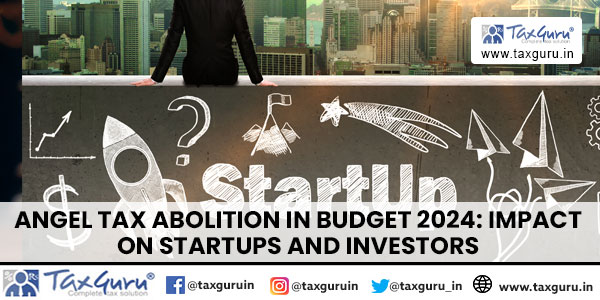Angel Tax, first introduced in the Union Budget 2012 by Finance Minister Pranab Mukherjee, was designed to curb money laundering through investments in startups and identify fraudulent firms. This tax, under Section 56(2)(viib) of the Income Tax Act, targeted investments exceeding the fair market value of shares issued by private companies. However, significant changes are underway with its proposed abolition in the Finance Bill 2024. This article provides a detailed analysis of Angel Tax, its provisions, challenges, and the implications of its abolition.
PROVISIONS OF Section Section 56(2)(viib) – ANGEL TAX
56(viib) where a company, not being a company in which the public are substantially interested, receives, in any previous year, from any person, any consideration for issue of shares that exceeds the face value of such shares, the aggregate consideration received for such shares as exceeds the fair market value of the shares:
Provided that this clause shall not apply where the consideration for issue of shares is received—
(i) by a venture capital undertaking from a venture capital company or a venture capital fund or a specified fund; or
(ii) by a company from a class or classes of persons as may be notified by the Central Government in this behalf.

APPLICABILITY
Until Finance Act 2023, it was taxed only if investments were made by resident investors. Last year, the words “any person being resident” were replaced with the words “any person” including Foreign Investors in this clause.
DETAILED EXPLANATION
- This Tax is imposed on funds raised by startups from angel investors
- However, this is imposed on funds raised that exceed the fair market value of the company.
- For Example: If the Company’s fair market value is Rs. 50Lakh and it raised 80Lakh, then the excess amount of Rs. 30 Lakh is subject to tax under this section.
- Tax Rate: 30.9% (Tax 30% plus 3% cess) would be levied on Rs. 30Lakh.
EXEMPTION FOR STARTUPS
Since 2019 Union Budget – these provisions were eased by giving an exemption for Startups that had been approved by the Inter-Ministerial Board (IMB).
As of date, only around 1% of the Startups that have been registered, have been certified by IMB, as innovative and receiving benefits under the Income Tax Act, 1961.
PROBLEMS AND CHALLENGES FACED
- Recognition and Certification by IMB to avail exemption is a practical difficulty.
- Highly impractical to assess and value a start-up.
- Dispute between Assessee and Assessing Officers over the method used for ascertaining Fair Market Value (Tax authorities often used Discounted Cash Flow Method)
- Huge Taxes and Interest that are to be paid on receipt of notices 3-4 years after raising funds.
ABOLITION OF ANGEL TAX
BUDGET SPEECH CONTENT: First of all, to bolster the Indian start-up eco-system, boost the entrepreneurial spirit and support innovation, I propose to abolish the so-called angel tax for all classes of investors.
AMENDMENT PROPOSED – FINANCE BILL: In section 56 of the Income-tax Act, in sub-section (2), in clause (viib), after the second proviso, the following proviso shall be inserted with effect from the 1st day of April, 2025, namely:–– “Provided also that the provisions of this clause shall not apply on or after the 1st day of April, 2025.”.
MY VIEWS ON THIS PROPOSAL
This boosts the ecosystem, which is expected to encourage more investment and innovation within the start-up community. Also, reducing the compliance burden and potential disputes with tax authorities. This step gives a positive signal, demonstrating government support towards entrepreneurship, and building trust among investors. Lastly, it creates jobs and this step enhances competitiveness on the global stage.






Very Nicely Articulated